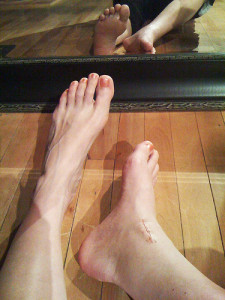Often a criminal defense case will rely on the use of expert testimony. Whether it is DNA evidence, blood splatter, fingerprint or hair analysis, this evidence must be tested and interpreted, and the results relayed to the jury by an expert in the field. Much of the forensic evidence used in criminal trials is well accepted theory. The prosecutor and defense attorney may disagree on whether the fingerprint analysis points to the defendant, or whether the results of DNA testing pinpoint the defendant as the suspect, but they do not question the science behind this evidence or its ability to be used to identify a suspect.
But what happens when a new type of science comes along, such as say, forensic podiatry?
Use of Expert Testimony in Chicago Criminal Cases
Forensic evidence, when available, and questioning of the forensic expert, can often mean the difference between conviction and acquittal. If the evidence doesn’t point to the defendant as the one who committed the crime, the verdict is often (though not always) an acquittal. Likewise, if the expert can be debunked on the stand, whether due to a history of inaccurate analysis, improper credentials or because the other side’s expert comes across as more knowledgeable, the verdict can be swayed in favor of the side with the most convincing expert.
Not just anybody can be deemed an expert with the ability to testify in court regarding a particular subject. Some experts are recognized on a local level, and neither side will object to their being brought to the stand to testify as an expert in their particular field. In order to be accepted as an expert, the prosecution (or defense, depending on who is calling the expert) must show to the court that he has the necessary “knowledge, skill, experience, training, or education” regarding the subject matter of which he claims to be an expert. This proof is usually accomplished by the expert’s educational background, work in the field, publications, number of prior cases in which he has served as an expert and reputation in the field.
If, however, the witness claims to be an expert in a field that is new – such as forensic podiatry – the requirements to be admitted as an expert are a bit harder to prove. In addition to proving the necessary knowledge in his field, the prosecution or defense attorney (depending on who is calling the expert) has the burden of proving that the scientific principles or methodology underlying the expert’s opinion, and how he came to it, “is sufficiently established to have gained general acceptance in the particular field in which it belongs.”
What does this mean? It means that the prosecution must prove more than just “this witness is an expert because he works in this field.” In the growing field of forensic podiatry, which is not as generally accepted as fingerprint analysis or DNA, he would have to prove that the science behind the method is sound. The judge is responsible for making a determination as to whether a witness qualifies as an expert; the jury may give as much weight to the witness’ testimony as they wish, which means they can discard it entirely.
Both the prosecution and criminal defense attorney can call their own witnesses to the stand to testify about the same piece of evidence. It is then up to both attorneys to prove to the jury why their expert is the most credible, and why his testimony should be given the greatest weight during deliberations.
Chicago Criminal Defense Attorney
During his close to 20 years’ experience as a Chicago criminal defense attorney, David L. Freidberg has successfully cross-examined thousands of experts in a variety of fields, debunking the methodology, science and findings behind their reports. He has built relationships with a number of forensic experts in every field, and will work closely with them to find the holes in the prosecution’s expert reports. David L. Freidberg has the experience, relationships and tenacity you need to disprove the prosecution’s forensic experts. Contact the Chicago, Skokie or DuPage County office at 312-560-7100 24/7 to schedule your free initial consultation.
 Chicago Criminal Lawyer Blog
Chicago Criminal Lawyer Blog



